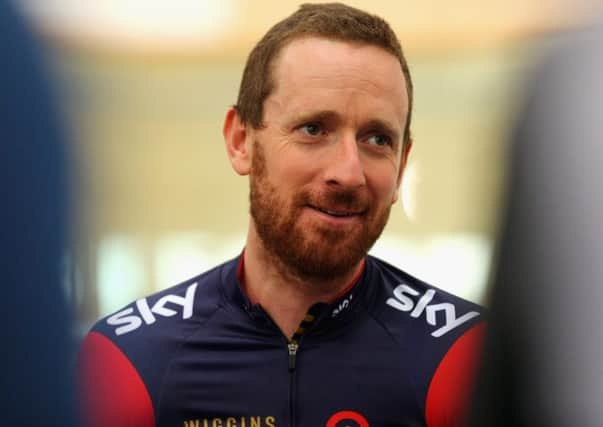Bradley Wiggins seeking Graeme Obree record


The world’s media will be in attendance, those who have been lucky enough to be accredited – journalists from throughout Europe were declined.
It is all a far cry from Hamar in Norway 25 years ago. Then, on a cycling track deserted apart from a couple of officials, a L’Equipe reporter, and family and friends, Graeme Obree put the hour record back on the map. On his homemade bike he also became the first of three British holders – at least until 7:30pm on Sunday, when Wiggins’ hour finishes.
Advertisement
Hide AdAdvertisement
Hide AdObree’s attempt at cycling’s fabled record was homespun. Wiggins’ is anything but, yet the 2012 Tour de France winner admitted this week, as he looked ahead to his date with the crowd and the clock, that part of him would relish the splendid isolation that was Obree’s lot in Norway.
“In some ways I wish I’d done it behind closed doors,” said Wiggins with characteristic contrariness. He was sitting in the track centre of the Lee Valley Velodrome after one of his final training sessions. Behind him hovered his manager from Simon Fuller’s XIX Entertainment, whose clients also include David Beckham and Andy Murray, and for whom nothing of any importance happens “behind closed doors”. But Wiggins has never paid much attention to his media training.
“It’s a bit like a wedding,” Wiggins continued, outlining the downside of an hour record attempt that is also a major media event.
“There are people you don’t want to invite but have to invite, and you end up in the last few days thinking, we can’t have him sat next to him because they’ll end up arguing.”
Minor concerns aside, Wiggins appeared relaxed and confident about the physical undertaking, describing the hour record as something he was born to do. He grew up with it. He was ten years old when Obree broke Francesco Moser’s nine-year-old world hour record with 51.596km in July 1993. A week later, Chris Boardman went 674 metres further, and thus was born a great sporting rivalry. Obree went again, beating Boardman’s mark in April 1994, taking it to 52.713km, before Miguel Indurain, the five-time Tour de France winner, got involved, taking it over 53km.
Asked whether he was a Boardman or Obree fan, Wiggins said: “Probably in the early days Obree. But then, as Chris went on to a professional career and the Tour de France, I looked at Chris more. But Hamar was incredible.”
Wiggins recalled that in 2003, after he had won the world pursuit title, he went to a book signing in Manchester.
“Graeme’s autobiography had just been published and I went to get my book signed, stood in the queue, and he recognised me, which was nice. I haven’t seen Graeme for ten years now,” Wiggins continued. “The last time, I got on the tube with him and travelled to Islington, to the London Bike Show. He’s a fascinating guy.”
Advertisement
Hide AdAdvertisement
Hide AdWhatever happens tomorrow, Wiggins is set to bow out of the sport next year as one of the legends. Boardman has a similar status, while Obree is more of a cult hero. Wiggins agrees that he doesn’t have the recognition that he deserves: “I don’t think he gets enough credit as an athlete.
“He gets all the credit as an engineer because of the bike he built and what he’s done since.
“But because he went about his business with the sandwiches and cornflakes, his physical attributes get overlooked. It’s a shame no one got hold of him then and tested him and measured his power output, because I think he was, in many ways, a freak of nature, athletically. But so much is focused on the engineering side and all the other events that have happened in his life that you forget about Graeme the athlete. And we never saw him on the road really excel. It’s a shame.”
It was largely Obree’s innovation that inadvertently mired the hour record in confusion in the 1990s, when cycling’s governing body, the UCI, kept banning the radical positions he came up with, and erasing records from the books (including Boardman’s ultimate record of 56.375km). The confusion lasted until the end of last year when a new set of guidelines was approved, since when there have been several attempts. In late April, Alex Dowsett became the third British holder, covering the distance – 52.937km – that Wiggins will try to beat on Sunday.
It would have been a shame if Wiggins had ended his career without one crack. “If I could’ve spent my whole career doing the hour record, I would’ve done,” he said this week. “There’s nothing to worry about – is your team-mate going to attack, or whatever.
“It’s so simple. It’s the purest form of cycling.”